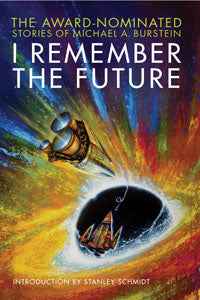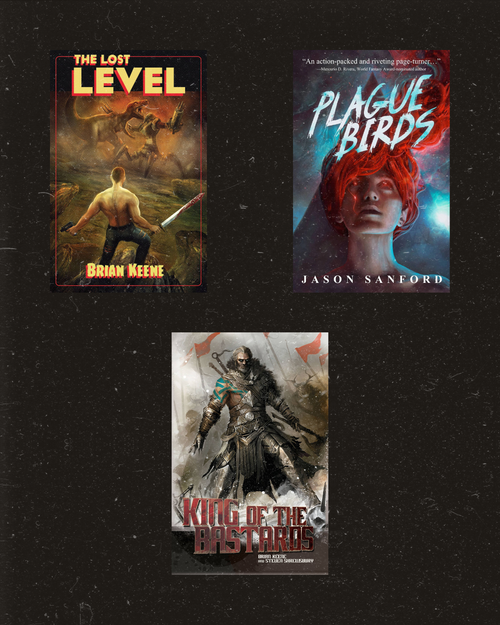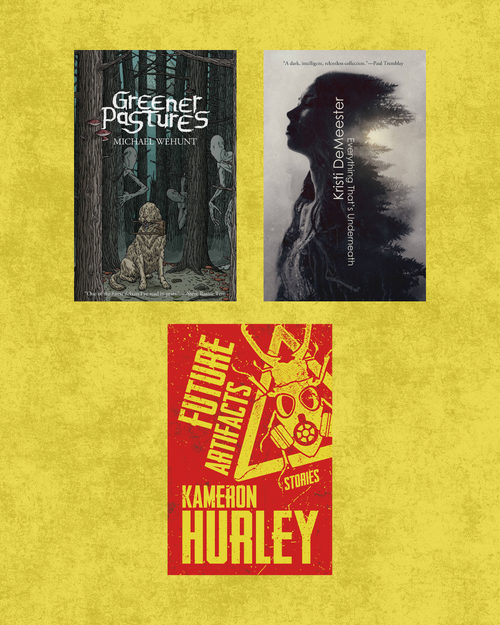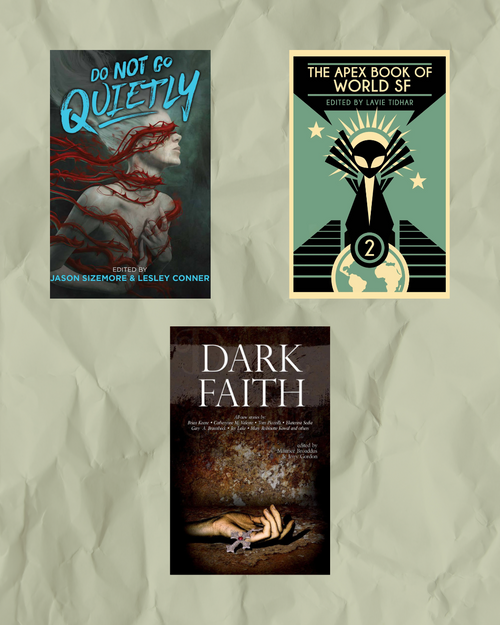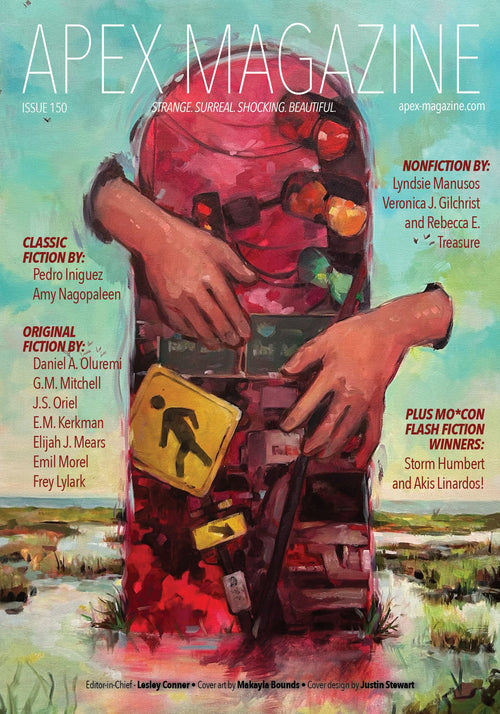I REMEMBER THE FUTURE
A Nebula-Nominated Short Story by Michael A. Burstein
The future was glorious once. It was filled with sleek silver spaceships, lunar colonies, and galactic empires. The horizon seemed within reach; we could almost grasp the stars if we would but try.
I helped to create that future once. We created it out of our blood, sweat, and tears for a penny a word. We churned that future out onto reams of wood pulp paper, only to see the bitter acids of the decades eat it away. I can still smell the freshness of that world, amidst the stale odors left in the libraries, real ink on real paper.
But I despair that no one else does.
* * *
Smith turned to Angela, whose face was obscured by the glass plate of her helmet. Despite the higher gravity and the bulkiness of his environmental suit, he felt like jumping a hundred feet into the vacuum.
“Angela, look!”
“What is it?” she asked. She reached over with her gloved hands to take the object from him.
“Gently,” he said as he handed over the sheet. “It’s paper. Real paper.”
Angela took it and handled it almost reverently. Once again, she looked around the large cavern at the many inscribed marble columns, flashing her light into every dark corner.
“Paper? That dead wood stuff you told me about? Made from trees?”
Smith nodded. “It’s true. We’ve found the ancient lost library of New Earth. And maybe, just maybe, in these volumes we’ll find the final clue that will lead us to the location of the original human home world.”
—Abraham Beard,
The Searchers (1950)
* * *
The day after my diagnosis, Emma comes to visit me at home. When she rings the bell, I get up from my seat in the living room, where I’ve been watching Forbidden Planet on DVD for the past hour, and I shuffle over to the front door at the end of the hall.
A cold wind blasts me as I creak open the door. I shiver momentarily as Emma strides past me.
As I shut the door, she opens the hall closet and lets her hands dance upon the hangers. She ignores the empty wooden ones and selects a blue plastic one.
“It’s the middle of the day and you’re still in your bathrobe?” she asks me as she slips off her overcoat.
“I’m retired and it’s the weekend,” I say. “Why should I get dressed up?”
“Because your only daughter is coming to visit? Oh, never mind.” She hangs up her coat.
“Where’s Frank and the kids?” I ask her.
She sniffs. “They decided to stay at home.”
The kids decided to stay at home. My grandchildren, Zachary and Kenneth. Or Zach and Ken, as Emma told me they prefer to be called. I haven’t seen them in months. “They didn’t feel like schlepping out to Queens?”
“It’s too cold.”
“So why the visit?”
Emma purses her lips and glances at the floor. “I thought it would be nice to see you.”
I know there must be more to it than that, but I don’t press it. Emma will tell me in her own sweet time. “Are you hungry?” I ask as we walk to the living room. “Do you want something to eat?”
She smiles. “What are you going to offer this time? A red pepper? A clementine?”
As it so happens, the refrigerator crisper holds many peppers and clementines, but I refuse to give Emma the satisfaction. “I thought you might want some ice cream.”
“Ice cream?” she asks with bemusement. “Sure, I’d love some ice cream. Where is it?”
“It’s in the freezer,” I tell her, although it should be obvious. Where else does one keep ice cream?
* * *
The first thing Larry noticed was the cold. It filled the core of his being, then slowly began to recede as tendrils of warmth entered his body.
Then he noticed a faint white light, blinking in the distance. Either the light became larger or it moved closer, and it continued to pulsate in a regular rhythm.
And finally he heard a hiss, the sound of air leaking quickly across a barrier. He tried to breathe and felt as if his lungs were filled with liquid. He tried again—
—when suddenly a door swung open, and Larry realized that he was floating vertically in a round glass chamber. The gelatinous liquid surrounding him quickly drained, and Larry fell into the arms of two men in silver jumpsuits.
“Easy now,” the taller one said. “Your muscles need time to adjust.”
Larry shook off their support. “I’m fine,” he croaked. He coughed up some fluid and spoke again. “I don’t need any help.”
“If you say so,” the taller man said.
“I do, indeed,” Larry answered. He stretched out of his stoop, and although his legs felt like they would give way, he refused to give these strangers the satisfaction of seeing him fall.
“Where am I? What’s going on?” he asked.
“All in due time,” the shorter man said in a thin, reedy voice.
Larry turned to stare at him. “I am Larry Garner, the richest man on Earth, and I demand you tell me what’s going on, now!”
The two men looked at each other, and the shorter one shrugged. “Usually, we give people more time to adjust, but if you insist—”
“I do!”
“You’re in the future,” the man said. “It’s two thousand years since you died.”
Larry fainted.
—Abraham Beard,
The Unfrozen (1955)
* * *
“Earth to Dad? Hello? Are you there?”
Emma is waving a hand in front of my face.
“Sorry,” I say. “I was just thinking. My mind—”
“Was elsewhen. Yeah, I’ve heard that before.”
I realize that we are sitting in the dining room and that Emma has scooped two bowls of ice cream, one for each of us. I pick up my spoon and take a bite. It’s butter pecan.
I hate butter pecan, but I bought some for when Zach and Ken were last here.
The ice cream is very badly freezer-burned. It’s so cold against my tongue that it hurts. I put the spoon down into the bowl and watch Emma eat her ice cream.
“You can take the rest of it when you leave,” I say. “The kids might enjoy it.”
Emma gives me a half-smile. “Even with the cold outside, it’ll probably still melt before I get it home.”
“Oh,” I say.
We sit in silence for a few moments, the only sound the tick of the analog clock in the other room, the clock my wife, Sheila, bought when we got married, the clock that hangs above the flatscreen television set that Emma and Frank gave me for my last birthday.
“So, how are things?”
“Things are good.”
“The kids doing well at school?”
“Yeah.” Emma smiles. “Zach did a PowerPoint presentation on blogging for one of his teachers.”
I nod and try to keep my face neutral, but Emma sees right through me. “You disapprove?”
“It’s not that,” I say. “It’s just—”
“I know what it is. Rant number twenty-three.”
“I’m not that predictable.”
She crosses her arms. “Fine. Then what were you thinking?”
I pause for a moment, but she doesn’t sound sarcastic so I say, “When I was growing up, the future seemed so full of possibilities.”
“We have possibilities, Dad.”
I shake my head. “We’ve turned inward. All of us have. We used to dream of a world as big as the sky. Now we’re all hunched over our tiny screens.”
Emma rolls her eyes. “Like I said, rant number twenty-three. Within three sentences, you’re going from the Internet to the lack of a manned space program again.”
“You don’t think it’s a problem?”
“It’s just that I’ve heard it before.”
“The more true something is, the more it bears repeating.”
“Nothing bears repeating if you can’t do anything about it.” She sighs. “I mean, seriously, what did you ever expect me to do at the age of twelve when you first warned me about the eventual heat death of the universe?”
* * *
The starship HaTikvah had finally made it to the edge of the universe. A hopeful mood filled the souls of the fifty thousand humans and aliens who occupied the ship, each the last of their kind.
On the bridge, Captain Sandra McAllister spoke into her intercom. “Fellow sentients,” she said, “this is the proverbial ‘it.’ The universe is ending, the embers of the stars are fading into nothing, and in a moment we’ll tap into the power of Black Hole Omega. If all goes according to plan, we’ll break out of our dying universe and into a new one, one that’s young and vibrant. Our own personal lives will continue, but more importantly, we will continue to exist in order to be able to remember all of those who came before us.”
McAllister turned to her first officer and said, “Any time you’re ready, Jacob. Push the button.”
Jacob nodded and reached out with his spindly fingers to the Doorway Device. But just as he was about to depress the red button, a blast rocked the ship.
“What was that?” he cried out.
Virilion, the ship’s robotic helmsman, replied in a croak, “It’s the Nichashim! They’ve come to stop us!”
McAllister narrowed her eyes. “Like hell they will,” she said. “Virilion, fire at will! Blast them out of our sky!”
—Abraham Beard,
Fire and Ice (1980)
* * *
“Dad? Dad?”
“You don’t need to shout.”
“You were gone again,” she says.
“Perhaps,” I say, “I’m turning inward because I’m getting old.”
For the first time since she came into the house today, Emma looks worried. “You’re not that old, Dad.”
I smile at Emma to keep her from noticing the wetness I feel in my eyes. “That’s nice of you to say, but it’s not true. I am old.”
“You’re only as old as you feel. You told me that once.”
I shake my head. “It’s hard to feel young when so many of my colleagues are gone.” First Robert, then Isaac, now Arthur, I think, although I don’t say it aloud. I know Emma too well; she might laugh at me for placing myself among such giants.
Instead, she doesn’t seem to know what to say in response. She fidgets for a few seconds, eats some more ice cream, and then changes the subject.
“Listen, Dad, I’m here because I have news.”
“Funny, so do I. You go first.”
“Are you sure?”
“Yes, I’m sure. What is it?” I ask.
She takes a deep breath and looks me in the eye. “We’re moving to California.”
* * *
Jackie looked at the gleaming silver spaceship with portholes running all up and down its sides. She felt more excited than she ever had before in her six years of life. Soon, her family would leave behind this polluted, depressing planet for a new world filled with cool green fields, rich with possibilities.
Jackie’s mother and father held tightly onto her hands as the three of them walked in the line out onto the launching pad. The hoverlift floated next to them, carrying their luggage, while Jackie’s robot dog kept running ahead and back toward Jackie, matching her excitement.
Finally, after what seemed like hours but Jackie knew was only minutes according to her chronometer, Jackie and her parents made it to the open hatch of the spaceship. A stewardess, her hair dyed platinum blonde, stood at the doorway greeting the immigrants with a big smile. She took their tickets and welcomed them aboard.
“Is this really it, Dad?” Jackie asked
Her father removed the pipe from his mouth and smiled. “It is indeed,” he said. “Goodbye, Earth! Next stop, Mars!”
—Abraham Beard,
The Burns Family on Mars (1960)
* * *
“Dad? You’re gone again.”
“No, I’m not,” I say.
“So.” Emma says. “We’re moving to California.”
“Why?”
She takes a deep breath. “Frank’s got a new job. UCLA is offering him a tenured position. Full professor.”
“UCLA. Hm. California.” I try to sound as noncommittal as possible, although Emma must know how much this news hurts me.
“Yes, California.”
“From what I hear, California is a nice place.”
She frowns and looks puzzled. “Aren’t you going to object?”
“Are you asking me to?”
“Don’t you even want to know why we’re moving?”
“You told me—Frank’s got a job offer.” I pause. “What about you?”
“What about me?”
“I don’t think you’ll be able to keep working at the New-York Historical Society if you’re living in L.A. Have you found a job at a museum there?”
Now she pauses before speaking. “I’m not planning to get another job, at least not right away.”
“Oh?”
“I want to be there full time for the kids.”
I stare into her eyes, seeing the six-year-old girl who wanted nothing more than to be the first astronaut to walk on Jupiter. “Is that really what you want?”
She glares at me. “I think at least one parent should be devoted full time to raising the kids.”
I feel the sting of her words. I consider once again telling her what I’ve told her before: that times were tough, that money was tight, and that Sheila and I both had to work to support Emma properly. But then I recall the many times I shut the door of my home office on Emma to meet a deadline, and I realize that the chance for apologies and explanations has passed far into the mists of time.
* * *
Allen Davidoff walked around the floating cube of mist, careful not to let any of the tendrils touch him. There was nothing else on this planet for miles around.
The Keeper, still covered entirely in her white garment, walked three paces behind him until he finally came to a stop.
He turned to face her. “Impressive,” he said. “An atmospheric phenomenon?”
She laughed and her hazel eyes twinkled. “You are pretending to be the fool,” she said. “You know better than that.
Allen nodded; she was right. He did know better, but he had previously allowed his hopes to be raised during his quixotic quest only to have them dashed time and time again.
“Then I’ve really found it?” he asked.
She nodded. “You have indeed.”
Allen looked back into the white mist. “It’s the Gateway of Time,” he said. “I can go anywhen into the time stream I want.”
“It’s the Gateway of Time,” the Keeper echoed. “You can go to any time period and any location in the universe you want. But there is one problem.”
Allen waited. The Keeper remained silent as his watch ticked off the seconds, and so finally he asked, “What’s the problem?”
The Keeper grinned evilly. “The only problem is, once you’ve made your choice and entered the past, you can never return. The trip is one way and final.”
“So—”
“So choose wisely.”
—Abraham Beard,
Amidst the Mists (1991)
* * *
“I hope it works out for you,” I say. “You know that I only want what’s best for you and the kids.”
If she notices that I don’t mention Frank, she doesn’t say anything about it. Instead, she nods and says, “You said before that you had news as well.”
I open my mouth to tell her about my diagnosis, as I had planned to do when she first called to tell me that she and the family wanted to see me, but then I hold back. I’m not dying yet, but I am old. My doctors say that my mind is not as sharp as it once was and my years are drawing to a close. If I tell her, maybe she and Frank will postpone the move, or at least stay closer to New York City, so I can keep seeing them in my dwindling, final days.
* * *
The last man on Earth said farewell to the spaceship carrying the rest of humanity to the stars. As the ship became a tiny dot in the sky, he took a deep breath of the fresh air and smiled. Someone had to watch over the planet as it was dying, and it was only right, he felt, that it should be he, and only he.
—Abraham Beard,
The Final Days of Planet Earth (1970)
* * *
I decide not to tell Emma about the diagnosis. It wouldn’t be fair to her or the kids to add that factor into the equation. But she’s waiting for me to tell her my news, and I only have one other piece of news to share. It’s extremely private, and possibly just the first symptom of my oncoming dementia, but I’ve felt the need to tell someone. And Emma is here, and Sheila is no longer here.
“Emma, may I confide in you?”
She tilts her head. “You never have before.”
I open my mouth to object, and then realize that she has a point.
“Well, I want to confide in you now. You know all those stories, all those novels that I wrote?”
“Yes,” she says flatly. “What about them?”
“My entire life, I never felt like I was coming up with anything on my own.” I stare over her shoulder. “Sometimes, when I was lying awake at two or three in the morning, I would get the feeling that the images in my mind weren’t just things I was making up myself. I felt as if I was a conduit, as if I had lifted an antenna into some sort of cosmic fog and that I was receiving messages, real messages, from the future in my dreams.”
Emma sits stoically as I tell her this. I don’t know what reaction I am hoping for, but Emma rolling her eyes is definitely not it. Still, it’s what she gives me.
“So what’s the news?”
“I’m not really sure,” I say. “You know how I haven’t written anything new for five years now? That’s because the messages stopped. Except…”
“Except what?”
“The dreams have started up again. I’ve been waking up again in the middle of most nights, feeling as if the future is trying to reach me one more time. But as soon as I wake up, the images the future is trying to send me recede into the distance.”
She sighs and stands up; I can’t tell if she’s angry or just frustrated. “You’re bouncing story ideas off of me again, aren’t you?”
“No,” I say, shaking my head. “No, I’m not. This is really happening to me.”
Emma’s expression is pitiful. “So that’s your excuse,” she says softly. “The future was really trying to contact you, and that’s why you always had your head lost in the clouds.”
I try to protest, but, ironically, I have no words. Emma picks up the bowls and used spoons and takes them into the kitchen. I hear her wash them quickly and leave them on the drainer while I sit at the table, unsure of what to say to her to make it all better.
She emerges from the kitchen and dashes through to the hall closet. I hear her put on her coat, and then she is back in the dining room, standing over me.
“Dad, you were always so busy living in the future that you never enjoyed your present. And now you don’t even live in the future anymore. You’re living in the past.”
With that, she walks out of the room and out of the house.
* * *
Over the next few days, Emma uses my spare set of keys to let herself into the house. She barely nods hello to me as she climbs to the attic and sifts through the boxes, packing away those few remnants that she wants from her childhood.
I want Emma to leave the photographs, but I’ve come to realize that she’s going to have to take them with her anyway if I want my grandsons to continue to remember what their grandfather and grandmother looked like. Emma tells me that she will scan the photos into her computer and send me back the originals, and I just nod.
The days pass far too quickly. Finally, the last morning arrives in which Emma will be coming over to take the last few boxes of possessions. What she doesn’t know as she is driving over is that this morning is also the morning of my final moments on this Earth. And in my final moments on this Earth, I am redeemed.
* * *
I am lying in my bed, wearing my favorite blue pajamas and peering through my glasses at the small print of a digest magazine. A half-eaten orange on a plate sits on my end table; I can still taste the juice on my tongue and feel a strand of pulp between two right molars.
And then it begins.
A slight breeze wafts toward me from the foot of my bed. I move my magazine aside and look, but I see nothing there but the wall and the closed bathroom door.
As I begin to read again, another breeze flutters my pages. Then the breeze builds, until a gust of wind flows past.
A tiny crack appears in midair, hovering about six and a half feet above the red-carpeted floor. The crack expands into a circular hole. White light emanates from the hole, which gets wider and wider, until it becomes a sphere about six feet in diameter, crackling softly with electricity. A human figure in a silver spacesuit, its face obscured by a helmet, emerges from the sphere with a loud popping sound.
I know this is no illusion, that whatever is happening in front of me is real. I manage to keep my composure and ask, “Who are you?”
The figure grabs hold of its helmet, breaks the seals, and pulls it off.
The astronaut is a woman. She shakes her long blonde hair out of her face and smiles. “You know who I am, Abe. Take a good look.”
I do, and I feel a chill. “It can’t be.”
She nods. “It is.”
“You’re Sandra McAllister. But you’re fictional. You don’t exist. I made you up.”
“Yes, you did make me up. But I do exist.”
“I don’t understand.”
“We figured you might not, but we don’t have a lot of time, so listen carefully. As far as our scientists have been able to determine, every time you wrote a story, you created a parallel universe, a place where the people you thought of really existed. Apparently, your brain has some connection on a quantum level with the zero-point energy field that exists in the multiverse. You’ve managed to bend reality, our reality, so that we ended up existing for real.”
“That’s not possible,” I say.
“You’re a rational man, Abe, I understand that. So explain my presence some other way.”
I know in my heart and soul that I am not hallucinating. And with the impossible eliminated, I am left with the improbable.
“So you’re real?”
“Not just me,” Sandra says.
I start thinking of all the characters I created throughout my career. “Jackson Smith and Angela Jones? Larry Garner? Jackie Burns? Allen Davidoff? They’re all real?”
Sandra nods after I recite each name. “They’re all real. We’re all real.”
“Even if so, how did you break through the barrier between universes? It’s not possible.”
“It is if you harness the energy of a black hole using the Doorway Device.”
I am puzzled for just a moment, and then light dawns. I recall the details of the story cycle from which Sandra comes. “The spaceship HaTikva,” I say.
“And the Nichashim,” she adds.
I goggle. “You’re mortal enemies,” I say. “I wrote you that way. How can you be working together?”
“The Nichashim understand that you created them too. We’ve got the two ships tethered together in orbit around New Black Hole Omega.”
I can’t help it; I flip the sheet off of my frail body and swing my legs around so I can stand up and face Sandra. “That’s far too dangerous, Sandra. You could lose both ships in a blink.”
“Which is why you must hurry.”
“I don’t understand.”
“Why do you think I came here?”
“Um, to say hello? To let me know that I didn’t live my life in vain?”
She rolls her eyes. “To rescue you. To cure you of your oncoming sickness, and to impart to you the same immortality you generously granted to all of us.”
“Rescue me? You’re using all that energy just to rescue me?”
She shrugged. “You’re our father. Why wouldn’t we?”
I feel tears starting in my eyes, and I move forward and hug Sandra as tightly as I can. She holds me as I cry.
“It’s all right, Father,” she says. “We’ve come for you. Welcome home.”
* * *
The last bit I can only guess at, as I was already gone by then. But the way I see it, as Emma was turning her keys in the lock, the house rumbled, and she heard a loud pop and whoosh coming from upstairs.
“Dad? Dad?” she called out, but I wasn’t there to answer her.
She dashed up the stairs and turned right, toward her father’s bedroom. She pushed the door open to discover her father already gone, amidst a trace of ozone.
I remembered the future.
And in turn, the future remembered me.
When Apex Publications decided to publish this collection, I asked the readers of my LiveJournal if they could come up with an appropriate title. A high school friend, Andrew Marc Greene, came up with I Remember the Future. I decided to go with that title for the book, and that meant writing a new story with that name as well.
As my publisher knows too well, it took me a while to figure out what this story would be about. I kept running the phrase “I Remember the Future” over and over in my head, but no story idea came to mind.
And then on the afternoon of Tuesday, March 18, 2008, we heard the news that Arthur C. Clarke had died. (Oddly, because Clarke lived in an earlier time zone, he died on Wednesday, March 19, but those of us living in the West heard the news on Tuesday. It’s almost like time travel.)
Late that night, as I stared into a mirror and thought about how the last of the Big Three was gone, I suddenly realized what this story had to be about. I quickly shared the idea with my wife, Nomi, and then jotted down a bunch of notes so I wouldn’t forget it. I also called Janna Silverstein, since I needed to tell another science fiction and fantasy writer about the epiphany I just had and it was too late to call anyone on the east coast.
If you’re reading these stories in order, I suspect you’ll discover very quickly why I grouped these last three together the way I did. I’ll have more to say about that in the afterword to “Paying It Forward.”
“I Remember the Future” is dedicated to Arthur C. Clarke.








